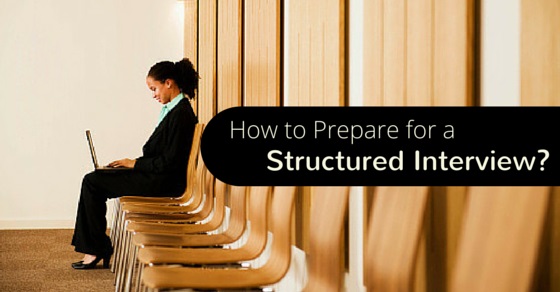One of the most important assessment tools that one can find, which helps the recruiter to analyze the capabilities and skill sets of the interview candidate, in order for them to see if one is a perfect fit for the position is the job interview process. It is a little time consuming and a complex process.
One of the most common types of interview is the structured interview process, which helps the employer to make accurate hiring decisions. In the meantime, to land the job, following are few job interview techniques a candidate would have to know for interview preparation for a structured interview.
Structured Interview Definition:
Structured Interview is also known as Fixed Format Interview and the questions asked are well prepared ahead of time and asked in the same order to all the applicants. Even if this method is not as smooth and lacks the conversational tone, like with the unstructured interview, the method of interview is very reliable and precise.
A structured interview is a researcher administered survey based on quantitative or qualitative research. It is a kind of statistical survey and is considered a way via which data is collected using the open ended questions.
For the time being, an extra name for the structured interview is the pattern interview and is carried out via two methods. In the first one, at the beginning, the interviewer could ask the same set of questions to all the available candidates, thus making it easy for the recruiter to compare and analyze all the questions and answers given by the applicants, before arriving at a conclusion.
The second method is to make all the candidates to fill out a survey with all same questions, so as to compare all their answers later and then to arrive to the answer. The entire set of questions is set ahead of time and asked to all candidates alike to help the interviewer to make the assessment, by comparing all the answers and choosing the best one.
Structured Interview Process:
Prior to carrying out the process of structured interviews, one would need to understand the focus and objective of the interview. First, decide on the type of interview that would take place, that is, one would need to confirm if it would be a telephonic, or face-to-face interview.
Then, the recruiter can go on to confirm the interview schedule with the applicant. Most of the structured Interviews have a format that is fixed and follows the schedule. The questions are asked in a particular order. This definitely goes on to ensure the reliability of the interviews.
Advantages of Structured Interviews:
One of the major and important advantage of Structured Interview is that all the candidates have the same chance to verify if one has the skills and ability that is needed for the job profile. At the same time, from the questions asked at the structured interview, the recruiter can go on to learn all the initial information as well as the professional details about the candidate.
Disadvantages of Structured Interviews:
One of the disadvantages is that prior to arriving to a conclusion, the recruiter will have to conduct interviews of a large number of people to begin the comparison. The questions need to be very specific. It also takes a lot of time to come to an end.
At the same time, since the process is based on data collection, no one will be able to assess the communication skills of the candidate.
Sample Structured Interview Questions and Answers :
The interview questions asked mainly depend on the type of position. In the meantime, one can take a look at the basic questions asked at structured interview, as well as best interview tips on how to answer these questions.
Tell me about oneself:
One of the major job interview questions asked in a Structured Interview is that the candidate will be asked to talk about oneself. One would be asked to talk about the previous jobs or to elaborate on one’s professional experience, as well at certain times. This helps the recruiter to ascertain if the applicant is a professional and also if the applicant is well prepared for the interview or not.
In the meanwhile the applicant will have to be very short and concise as well as to the point with the answers. One should put emphasis on positive experiences or the success stories and achievements, while on the look out for a job.
What is your academic qualifications?
Whoever is on the lookout for a job, need to as well understand the importance of academic or educational qualifications. For example, lack of education to some extent has been the reason for many people losing out on their job opportunities. Each job profile, requires a certain educational qualifications or total work experience.
For this reason, prior to applying for any job, the applicant needs to make sure that the requirements, such as work experience or educational qualification to apply for a job. One needs to see as well if one is qualified enough to apply.
Why the specific job or career?
Another common question asked, “why this particular job?’ or even ‘why this career?’ and so on is mainly done so by the recruiter, to see if the applicant is aware about the pros and cons of taking up the particular job. However, answering this question can be kind of tricky.
At the same time, what the applicant needs to avoid is clichéd answers like one is in it for money or that it is an easy job, even if it be the truth. Make sure to also, avoid answer like the candidate chose the particular job, mainly for the reason that relatives or friends asked one to chose the specified job or company.
At the same time, the applicant will have to go on and express one’s interest in the said job. Go on to show that what one expects to do is to grow within the company. One could also state that it is a good fit for one’s skills, even as the company also provides ample opportunity for the applicant to grow one’s skills.
What are your strengths and weaknesses?
Most of the companies like their candidates to be well prepared with this SWOT analysis. The fact that the candidate has proper knowledge of one’s strengths and weaknesses, assures the recruiter that one is qualified and experienced enough to handle the job.
Asked to talk about one’s personal life:
For the most part companies try to assess the character of the candidate to see if they are a good fit for the job profile. One can opt to do so by analyzing the answers given by the candidate to the questions asked as part of the structured interview, related to the candidate’s personal life such as If a candidate is married Or if One has kids?
It is important to know these answers, for the reason that each company may have their own policies for their different job profiles. For example, one might see that a single man or bachelor is a better fit for the job profile of a traveling salesman as opposed to a married man, same as a family man would do better as a senior manager and such.
Are you willing to relocate?
One of the most common questions, often asked during interviews. The answer to this needs to be very honest and based on fact. More often, companies require this answer to see if the candidate based in another city is willing to relocate to wherever the company Is located.
This is in fact an attempt by the recruiter to see if the candidate would be ready to take up the job,despite the location of the company. In the meanwhile, if ever, the answer to the question is no, the candidate needs to make this also known to the recruiter, at the onset.
Reliability of Structured Interview:
In the meanwhile, how much reliable the method is, depends on the list of the questions that are asked at the structured interview. At the same time, the validity of the method is also under confusion, as the questions were framed just before each interview.
For this reason, the information that one can get from this list of questions is not deep enough, and one cannot analyze any of the candidates as thoroughly. What one needs to know is that this method of interviewing, is very helpful if one wants to get general information about the candidate, on the other hand if the recruiter wishes to know more about the applicant, such as one’s skills, thoughts, behavior and so on, the structured interview method will not help, in any way.















































